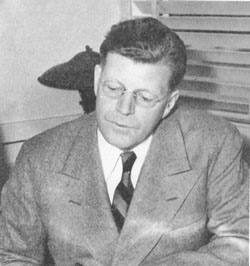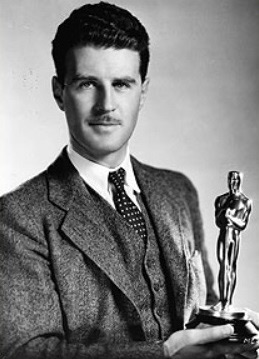Related Research Articles

Frederick Clinton Quimby was an American animation producer and journalist best known for producing the Tom and Jerry cartoon series, for which he won seven Academy Awards for Best Animated Short Films. He was the film sales executive in charge of the Metro-Goldwyn-Mayer cartoon studio, which included Tex Avery, Droopy, Butch Dog, Barney Bear, Michael Lah and multiple one-shot cartoons, as well as William Hanna and Joseph Barbera, the creators of Tom and Jerry.
The Academy Juvenile Award, also known informally as the Juvenile Oscar, was a Special Honorary Academy Award bestowed at the discretion of the Board of Governors of the Academy of Motion Picture Arts and Sciences (AMPAS) to specifically recognize juvenile performers under the age of eighteen for their "outstanding contribution[s] to screen entertainment".

Douglas Graham Shearer was a Canadian American pioneering sound designer and recording director who played a key role in the advancement of sound technology for motion pictures. The elder brother of actress Norma Shearer, he won seven Academy Awards for his work. In 2008, he was inducted into Canada's Walk of Fame.
The 12th Academy Awards ceremony, held on February 29, 1940 by the Academy of Motion Picture Arts and Sciences (AMPAS), honored the best in film for 1939 at a banquet in the Coconut Grove at The Ambassador Hotel in Los Angeles. It was hosted by Bob Hope, in his first of nineteen turns as host.

Konstantin Eduardovich Bronzit is a Russian animator and animation film director nominated twice for the Academy Award for Best Animated Short Film. He currently works at one of the largest Russian animation studio — Melnitsa Animation Studio, as the art director and consultant.

Moonbird is a 1959 short animated film by John Hubley and Faith Hubley in which two boys have an adventure in the middle of the night as they sneak out and try to catch a 'Moonbird' and bring it home. The film was animated by Robert Cannon and Ed Smith. It won an Oscar for Best Short Subjects (Cartoons) at the 32nd Academy Awards, in 1960.
Your Face is a 1987 animated short film by Bill Plympton. It involves a man seated in a chair crooning about the face of his lover, and as he sings, his own face starts to distort in various ways. His song ends abruptly when a mouth opens in the floor and swallows him and the chair whole; after the closing credits, the mouth reappears and licks its lips.
Justin Herman was an American screenwriter, film producer and director. He wrote for 42 films between 1934 and 1952. He was nominated for an Academy Award in 1950 for Roller Derby Girl and again in 1956 for Three Kisses. Both nominations were in the category Best Short Subject. He was born in Philadelphia, Pennsylvania and died in New Hope, Pennsylvania.

Sons of Liberty is a 1939 American short drama film directed by Michael Curtiz, which tells the story of Haym Solomon. At the 12th Academy Awards, held in 1940, it won an Academy Award for Best Short Subject (Two-Reel).

A Time Out of War is a 1954 American short war film directed by Denis Sanders and starring Corey Allen and Barry Atwater. In 1955, it won an Academy Award for Best Short Subject (Two-Reel) at the 27th Academy Awards, first prize at the Venice Film Festival Live Action Short Film category, and a BAFTA Special Award, among others.

So Much for So Little is a 1949 American animated short documentary film directed by Chuck Jones and Friz Freleng. In 1950, it won an Oscar at the 22nd Academy Awards for Documentary Short Subject, tying with A Chance to Live. It was created by Warner Bros. Cartoons for the United States Public Health Service. As a work of the United States Government, the film is in the public domain. The Academy Film Archive preserved So Much for So Little in 2005. Produced during the Harry S. Truman administration, it attained renewed relevance during the modern Medicare for All movement in the United States nearly seven decades later.

Thursday's Children is a 1954 British short documentary film directed by Guy Brenton and Lindsay Anderson about The Royal School for the Deaf in Margate, Kent, UK, a residential school then teaching lip reading rather than sign language. Apart from music and narration, the film is nearly silent and focuses on the faces and gestures of the little boys and girls. It features methods and goals not now used, and notes that only one child in three will achieve true speech. Filmmakers Lindsay Anderson and Guy Brenton were unable to gain distribution for the film until it won an Oscar in 1955 for Documentary Short Subject. The Academy Film Archive preserved Thursday's Children in 2005.
George Dudley was an American art director. He was nominated an Academy Award in the category of Best Art Direction for the film The Rains Came.
Prophet Without Honor is a 1939 short documentary film directed by Felix E. Feist. At the 12th Academy Awards, held in 1940, it was nominated for an Academy Award for Best Live Action Short Film, One-Reel. The documentary is about Matthew Fontaine Maury, a U.S. naval officer who created the first maps that charted the oceans' winds and currents.
Sword Fishing is a 1939 short documentary film. In 1940, it was nominated for an Academy Award for Best Live Action Short Film, One-Reel at the 12th Academy Awards. It is narrated by Ronald Reagan.
Drunk Driving is a 1939 American short drama film directed by David Miller. It was nominated for an Academy Award at the 12th Academy Awards in 1940 for Best Live Action Short Film, Two-Reel.

Five Times Five is a 1939 American short documentary film directed by Frank P. Donovan. It was nominated for an Academy Award at the 12th Academy Awards in 1940 for Best Live Action Short Film, Two-Reel. The Dionne quintuplets have a private five-years-old birthday party in their garden.
Edmund H. Hansen was an American sound engineer. He won two Academy Awards; one for Best Sound Recording and the other Best Visual Effects. He was nominated for another 12 films across the two categories.
Bernard B. Brown was an American sound engineer and composer, who wrote the scores for many early animated cartoons produced by Leon Schlesinger Productions for distribution by Warner Bros. Pictures. He won an Academy Award in the category Sound Recording and was nominated for seven more in the same category. He was also nominated three times in the category Best Visual Effects. He worked on more than 520 films between 1930 and 1958.
References
- ↑ "The 12th Academy Awards (1940) Nominees and Winners". oscars.org. Archived from the original on July 6, 2011. Retrieved August 10, 2011.
- ↑ "Preserved Projects". Academy Film Archive. Retrieved September 18, 2020.